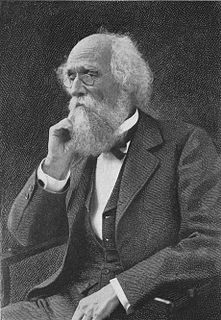A Quote by Marcus Aurelius
This is the chief thing: be not perturbed, for all things are according to the nature of the universal.
Related Quotes
There is nothing which Nature so clearly reveals, and upon which science so strongly insists, as the universal reign of law, absolute, universal, invariable law... Not one jot or tittle of the laws of Nature are unfulfilled. I do not believe it is possible to state this fact too strongly... Everything happens according to law, and, since law is the expression of Divine will, everything happens according to Divine will, i.e. is in some sense ordained, decreed.
The Idols of Tribe have their foundation in human nature itself, and in the tribe or race of men. For it is a false assertion that the sense of man is the measure of things. On the contrary, all perceptions as well of the sense as of the mind are according to the measure of the individual and not according to the measure of the universe. And the human understanding is like a false mirror, which, receiving rays irregularly, distorts and discolors the nature of things by mingling its own nature with it.
Again, if the world is destroyed, it must needs either be destroyed according to nature or against nature. Against nature is impossible, for that which is against nature is not stronger than nature. If according to nature, there must be another nature which changes the nature of the world: which does not appear.
Nothing comes to pass in nature, which can be set down to a flaw therein; for nature is always the same, and everywhere one and the same in her efficacy and power of action: that is, nature's laws and ordinances, whereby all things come to pass and change from one form to another, are everywhere and always the same; so that there should be one and the same method of understanding the nature of all things whatsoever, namely, through nature's universal laws and rules.
The basis of artistic creation is not what is, but what might be; not the real, but the possible. Artists create according to the same principles as nature, but they apply them to individual entities, while nature, to use a Goethean expression, thinks nothing of individual things. She is always building and destroying, because she wants to achieve perfection, not in the individual thing, but in the whole.




































